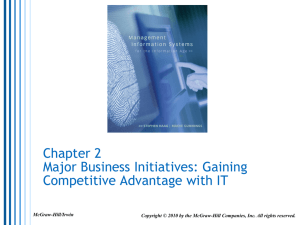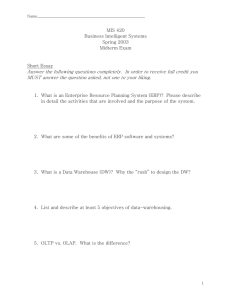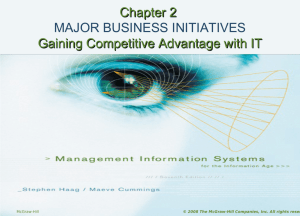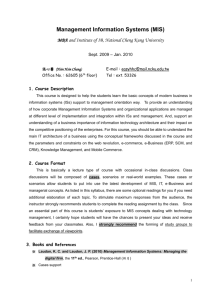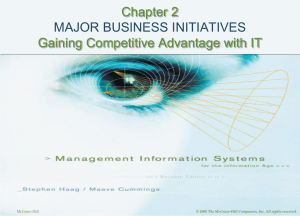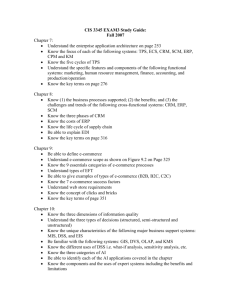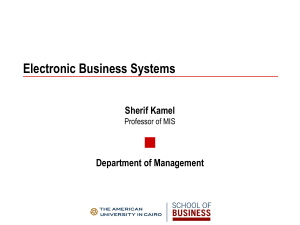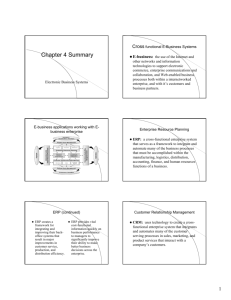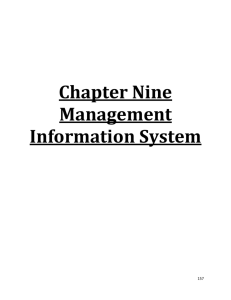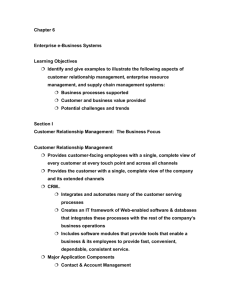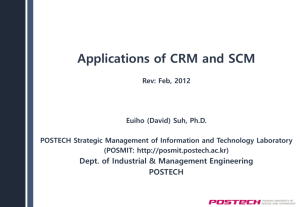Social networking system
advertisement
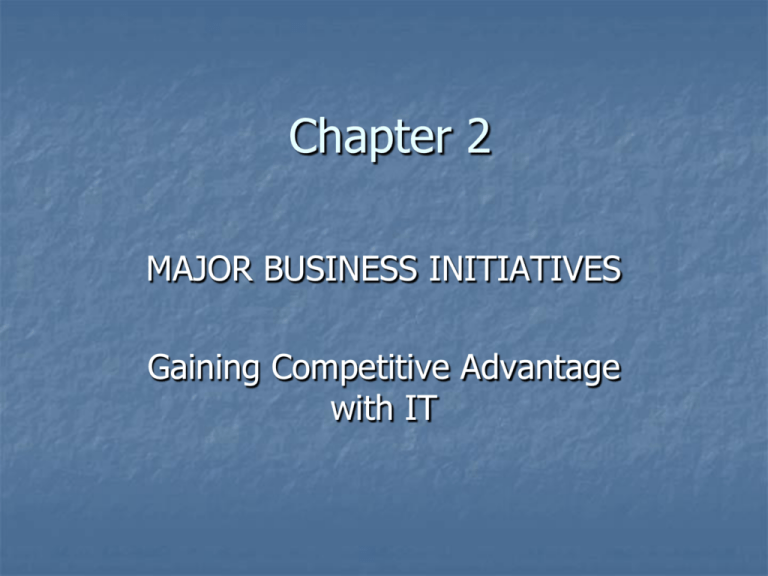
Chapter 2 MAJOR BUSINESS INITIATIVES Gaining Competitive Advantage with IT NONPAID, NONEMPLOYEE COLLABORATION: A NEW KIND OF BUSINESS MODEL IT-enabled collaboration can be powerful Extends empowerment beyond employees to include customers (and others) -- called crowdsourcing Goldcorp did it and made over $3 billion on a $500,000 investment Goldcorp published on the Web all its information regarding a 55,000-acre property It invited anyone to submit ideas of where gold might be and how to extract it Goldcorp received thousands of ideas, some of which yielded $3 billion in gold INTRODUCTION Businesses must be innovative to stay in business and succeed IT can be a powerful tool Must use IT within business strategy to be successful INTRODUCTION Major business initiatives that need IT Supply chain management (SCM) 2. Customer relationship management (CRM) 3. E-Collaboration 4. Enterprise Resource Planning (ERP) 1. What are Supply Chain Management Systems? Supply chain management (SCM) system Just-in-time Supply Chain Management Most supply chains use inter-modal transportation, multiple transportation channels (railway, truck, etc) to move products from origin destination This creates supply chain complexities Opportunities of SCM Goal is to squeeze out every penny of cost possible in the supply chain This will optimize fulfillment, logistics, production, revenue and profit, and cost and price SCM is now part of ERP software (discussed later) Radio Frequency Identification (RFID) On Products: WristBands: Healthcare: http://www.youtube.com/watch?v=_xNhL39uD7I http://www.youtube.com/watch?v=OrH4I9pSF1A http://www.youtube.com/watch?v=ZsxIVXvlEtc RFID tags An electronic product code RFID tag used by Wal-Mart RFID tags used in libraries An RFID tag used for electronic tolls collection Just after an operation to insert an RFID tag http://en.wikipedia.org/wiki/RFID What are Customer Relationship Management Systems? Customer relationship management (CRM) system Includes multi-channel service delivery, multiple ways in which customers can interact with a business Focuses on 1. Sales force automation 2. Customer service and support 3. Marketing campaign management and analysis Customer Relationship Management Customer Relationship Management Sales force automation (SFA) systems – automatically track all the steps in the sales process Sales lead tracking Listing potential customers Market and customer analysis Product configuration Getting repeat customers Opportunities of CRM Classic goals Treating customers better Understanding their needs and wants Tailoring offerings Providing “delightful” experiences Like SCM, CRM is now part of ERP software (discussed later) IT Support for CRM Front-office systems – primary interface to customers and sales channels Back-office systems – fulfill and support customer orders Both interface to CRM database and analysis and reporting systems IT Support for CRM E-COLLABORATION E-collaboration is the use of technology to support 1. 2. 3. 4. 5. Work activities with integrated collaboration environments Knowledge management with knowledge management systems Social networking with social networking systems Learning with e-learning tools Informal collaboration to support open-source information 1. Integrated Collaboration Environments Integrated collaboration environment (ICE) Virtual team An ICE can be as basic as e-mail or more sophisticated as in Workflow system – automation and management of business processes (processing a loan in a bank, processing a sales order, etc) Document management system – manages a document through all stages of processing Integrated Collaboration Environments 2. Knowledge Management Systems Knowledge management (KM) system – IT system that supports the capturing, organizing, and dissemination of knowledge throughout the organization Knowledge of facts Sources of information Solutions, patents, and trademarks Best-practice processes 3. Social Networking Sites & Systems Social networking site Myspace, Facebook, etc Social networking system More business focused 4. E-Learning Tools Facilitate learning on IT-enabled platforms WebCT, Blackboard, and e-College Used in education environments and also in business environments 5. Informal Collaboration Previous e-collaboration tools have “organizational” focus Information collaboration tools focus on “informal” groups of people getting together Wiki – allows you – as a visitor – to create, edit, change, and often eliminate content Such content is called open-source information, content that is publicly available, free of charge, and most often updateable by anyone Peer-to-peer – permits users to communicate in real time and share files without going through a central server IT CULTURE IT culture – refers to How the IT function is placed structurally within an organization The organization’s philosophical approach to the development, deployment, and use of IT IT Function Structural Placement Top-down silo – IT function handles all IT needs; strong “command and control” structure IT Function Structural Placement Matrix – Separate IT department but decision making is “matrixed” across the organization IT Function Structural Placement Fully integrated– separate IT function but IT personnel are placed within functional areas; tremendous empowerment IT Culture Philosophical Approach Ranging from… “Wait and see” Must prove ROI before adopting technologies Early adopters Support technology innovation failure, a reward system for trying new technologies even if they prove to be unsuccessful ENTERPRISE RESOURCE PLANNING How do you bring together SCM, CRM, and e-collaboration systems? With an ERP system. Enterprise resource planning (ERP) system ENTERPRISE RESOURCE PLANNING ERP Attempts to integrate everything CRM drives what SCM will produce Everyone works together in e-collaboration The entire organization knows the entire organization Think about your school Can you register for class with a bill outstanding? Can you register for a class for which you haven’t completed the prerequisite? ERP Integrates Everything
